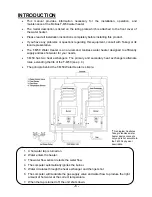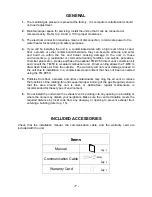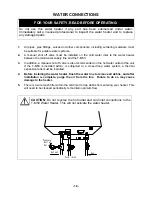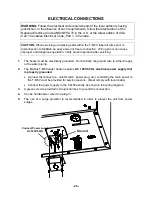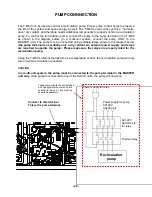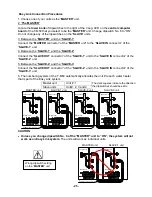
- 12 -
VENTING INSTRUCTIONS
WARNING:
Improper venting of this appliance can result in excessive levels of
carbon monoxide which can result in severe personal injury or death.
This water heater must be vented in accordance with the section “Venting of Equipment" of the
latest edition of the Natural Fuel Gas Code: ANSI Z223.1, All applicable local building codes,
Section 7 of CAN/CSA B149.1 Natural Gas in Canada, Propane Installation Code in Canada.
EXHAUST VENT
This is a Category III appliance and must be vented accordingly. The vent system must be
sealed air tight. All seams and joints
without gaskets
must be sealed with high heat resistant
silicone sealant or UL listed aluminum adhesive tape having a minimum temperature rating of
350ºF. For best results, a vent system should be as short and straight as possible.
1.
This Takagi water heater is a Category III appliance and must be vented accordingly with
any 5” vent approved for use with Category III or Special BH type gas vent.
2.
The following are UL listed manufacturers: ProTech Systems Inc. (FasNSeal), Flex-L Inc.,
Z-Flex Inc. (Z-Vent III), Metal-Fab Inc., and Heat-Fab Inc. (Saf-T Vent).
3.
Follow the vent pipe manufacturer’s instructions when installing the vent pipe.
4. Do not common vent this appliance with any other vented appliance
(Do not
terminate vent into a chimney. If the vent must go through the chimney, the vent must run
all the way through the chimney with Category III approved or Special BH vent pipe)
.
5.
The maximum length of exhaust vent piping
must not exceed 50 ft. deducting 5 ft. for each
elbow used in the venting system. Do not use more than 5 elbows.
Diameter
Max. No. of Elbow
Max. Vertical or Horizontal run in Length
5”
5 Ea.
50 ft
*For each elbow added, deduct 5 ft. from max. Vent length.
No. of Elbows
Max. Vertical or Horizontal Length
0 50
ft.
1 45
ft.
2 40
ft.
5 25
ft.
6.
When the horizontal vent run exceeds 5 ft., support the vent run at 3 ft. intervals with
overhead hangars.
7.
Takagi will not be responsible for any damage to the water heater caused by condensation
from the vent. For horizontal runs, slope the vent run downwards toward the vent terminal
at a rate of ¼” per foot. For horizontal runs that do not slope downward and for vertical
runs, installing a condensate drip is recommended. Please refer to p. 14 for the diagrams.
When installing the vent system, all applicable national and local codes must be
followed. If you install thimbles, fire stops or other protective devices and they
penetrate any combustible or noncombustible construction, be sure to follow all
applicable national and local codes.



